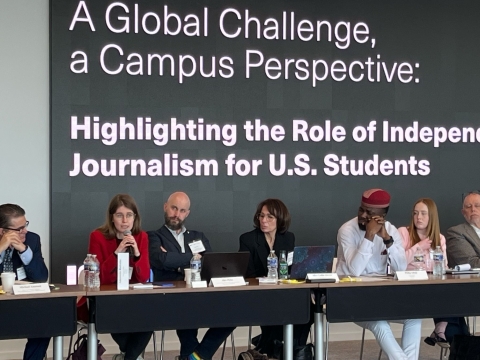As Russian tanks rumbled toward Kyiv in February 2022, many Ukrainians took up guns to defend their homeland. Anastasia Rudenko has taken a different path. She turned to solutions journalism to fight the horrors of war.
“I was looking for what was happening beyond the battlefield,” said Rudenko. “Reports also needed to highlight resilience, innovation and the ways Ukrainians were organizing to survive and rebuild. These stories were often overlooked, and I wanted to change that.”
She had started Rubryka, an online media outlet operating as a how-to platform with guides and resources for civic initiatives, in 2018. During the COVID-19 pandemic, the publication shifted its focus to solutions journalism.
Today, it operates as a wartime pipeline helping Ukrainians in their struggle for survival. Of the 2.1 million monthly website visits, 80% comes from within Ukraine. Some of Rubryka’s content is published in English.
“Anastasia and her publication are the success stories of solutions journalism, not just in Central and Eastern Europe, but likely in all of Europe. They are living and breathing solutions journalism,” said Jeremy Druker, Transitions Online’s executive director, who Rudenko credits for introducing her to solutions journalism in 2019.
Rubryka’s coverage
What sets Rubryka’s reporting apart from other outlets is its ability to incorporate the main concepts of solutions reporting into its articles. Each piece the outlet publishes responds to a social problem, offers insight, looks for evidence, explores limitations of what does and doesn’t work, and shows how solutions can be replicated.
“When I tell people about Rubryka, their first reaction is: ‘Wow, can they really find solutions in a country suffering that much?’” said Tina Rosenberg, co-founder of the Solutions Journalism Network (SJN), a staunch supporter of Rubryka’s work. “And their second reaction: ‘If I lived there, I would need to read this, just to keep going.’ These stories help keep hope and citizen action alive in Ukraine.”
Rosenberg cited Rubryka’s stories about Ukrainians caring for wounded soldiers all the way through rehabilitation, and teachers volunteering to go to the front lines or into occupied territory to teach children in Ukrainian. “These stories not only lift up readers, but they are also stories any journalist would be proud to write,” she said.
Rubryka’s reporters have also produced reports on how to help victims during explosions; women defying stereotypes to rebuild homes destroyed by war; grandmothers supporting children’s health through play, and rehabilitation for Ukrainian soldiers who have lost their sight in battle.
Tips for solutions reporting
For those just getting started in solutions journalism, Rudenko offered the following advice:
- Learn everything you can about how solutions journalism works, the main keys and concepts for powerful solutions, and the formula for doing this kind of reporting.
- Build a source network. Analyze best practices, case studies, and stories in your country. Sources might include NGOs, activist groups, cooperative government agencies and ordinary citizens.
- Network with and learn from your colleagues. Stay in touch with journalists at home and abroad. Networking is important for support, learning new techniques, and making friends in the solutions journalism world.
Ask yourself:
- How are journalists in other places covering similar stories?
- Is there potential for a cross-border project on a common topic?
- Are there any parallels to learn from their experience?
In February, Rudenko participated in an ICFJ roundtable with U.S. media, university students, faculty, and foundation leaders. During the event, which was held in partnership with Freedom Forum and Vanderbilt University, with support from the Lumina Foundation, she noted that 88% of Rubryka’s funding had disappeared overnight, most of it tied to various U.S. government-funded programs. She is looking for ways to keep Rubryka alive through donations or new grant opportunities.

Additional resources
SJN’s Learning Lab is a solutions journalism guide that offers a wide range of advice on finding story ideas, asking good interview questions, producing powerful narratives, and more.
SJN’s The Whole Story’s article on how to do solutions journalism in a time-crunch provides 14 tips from journalists, including letting people talk about the problem and solutions, and finding sources with “lived experiences.”
Rubryka’s article on Ukraine’s reconstruction strategy investigates how solutions journalism can help restore the country, the strategic value of the approach, and how it can be applied by Ukrainian media today.